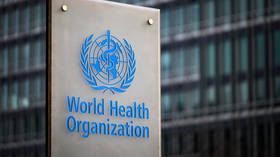WHO predicts Covid pandemic ‘acute phase’ end date

World Health Organization (WHO) Director-General Tedros Adhanom Ghebreyesus reiterated his call to prioritize the vaccination of around 70% of the world’s population. He added that this would ensure the “acute phase” of the Covid-19 pandemic ends this year.
Speaking at a press conference in South Africa on Friday, the WHO chief said expectations were that the worst of the pandemic would be over by “mid this year around June, July” if the vaccination target is achieved. His comments came days after warning that the coronavirus was not “finished with us.”
Crossing that vaccination threshold is “not a matter of chance,” but a “matter of choice,” Tedros said, adding that the decision to mobilize resources to meet that target is “in our hands.”
He noted that “more than 10 billion doses had been administered globally” over the past two years, but said the “scientific triumph” of Covid-19 vaccine development and deployment had been “marred by vast inequities in access.”
While “more than half the world’s population is now fully vaccinated,” he said “84% of the population of Africa is yet to receive a single dose.” The concentration of vaccine production in a “few mostly high-income countries” is to blame for “much of this inequity,” he noted.
Only 11% of Africans have reportedly been vaccinated, making it the least inoculated continent in the world. Last week, the WHO’s Africa office said the region needed to boost its vaccination rate by “six times” in order to meet the WHO’s 70% target.
To that end, Tedros stressed the “urgent need to increase local production of vaccines” in “low- and middle-income countries.” He pointed to the recent development of the continent’s first locally-produced mRNA Covid vaccine – made using the Moderna shot’s sequence – as a promising step. It was created by Afrigen Biologics and Vaccines through a pilot technology transfer project, backed by the WHO and the COVAX initiative.
“We expect this vaccine to be more suited to the contexts in which it will be used, with fewer storage constraints and at a lower price,” Ghebreyesus said, adding that the shot will be ready to begin clinical trials later in the year, with approval expected in 2024.













